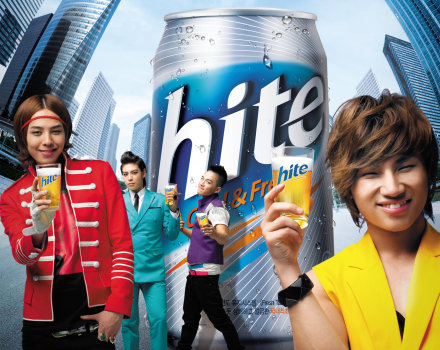Economic repression is commonly associated with the regime of North Korea – certainly not South Korea. But that might be one of the reasons that bad beer rules in this country – at least that’s what The Economist recently suggested:
Local brews such as Cass and Hite go down easily…. Yet they leave little impression on the palate. Some South Korean beers skimp on barley malt, using the likes of rice in its place. Others are full of corn. And despite the recent creation of Hite Dry Finish–a step in the right direction–brewing remains just about the only useful activity at which North Korea beats the South. The North’s Taedonggang Beer, made with equipment imported from Britain, tastes surprisingly good.
The problem is that South Korea has its own Big Beer problem. The country is dominated by a powerful duopoly made up of Hite-Jinro and Oriental Brewery who control nearly 100% of the marketplace. They have massive economic power and can easily crush aspiring smaller brewers who seek to compete. Their beers are interchangeable; their prices, the same, writes The Economist and government regulations make it difficult for new brewers like Seoul-based Craftworks Brewing Company to compete:
 Brewers are taxed heavily if they deliver their own beer. Craftworks’ unpasteurized brews must be kept chilled from the vat to the tap, which creates a problem. Cold distribution is a tiny, pricey niche. This is because the big boys don’t use it: their beers have their tasty, bureaucrat-bothering bacteria removed at the brewery. They can thus be delivered warm and then chilled in the pub.
Brewers are taxed heavily if they deliver their own beer. Craftworks’ unpasteurized brews must be kept chilled from the vat to the tap, which creates a problem. Cold distribution is a tiny, pricey niche. This is because the big boys don’t use it: their beers have their tasty, bureaucrat-bothering bacteria removed at the brewery. They can thus be delivered warm and then chilled in the pub.
“Punitive tariffs prevent brewing experimentation…The Korean taxman treats malt, hops and yeast as beer ingredients, which are subject to low import duties…Anything else you might put in the brew is deemed an agricultural import, and thus a threat to the nation’s farmers,” The Economist writes. Any grains (such as oats,) that aren’t on the approved list might be taxed at a rate of 500% should brewers choose to use them and this kind of tariff most certainly discourages brewers from experimenting.
Finally, the South Korean government limits wholesale licenses to brewers with the capacity to produce 120,000 liters and that’s very big threshold for many of the country’s craft beer start-ups
South Korea’s crushing regulatory environment supports the big beer establishment and the beer that those majors brew blows. So for now, we suggest that you stick with their cuisine and avoid their beer like the plague.
 American Craft Beer The Best Craft Beer, Breweries, Bars, Brewpubs, Beer Stores, And Restaurants Serving Serious Beer.
American Craft Beer The Best Craft Beer, Breweries, Bars, Brewpubs, Beer Stores, And Restaurants Serving Serious Beer.
